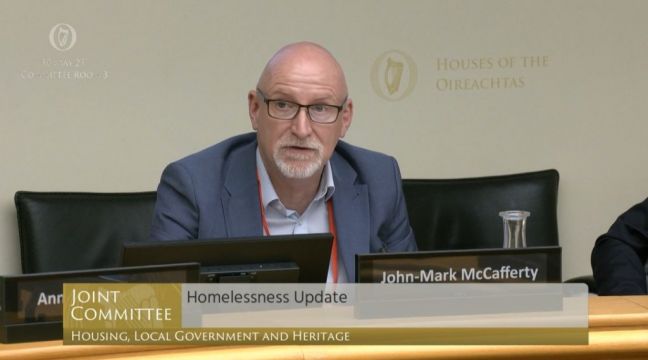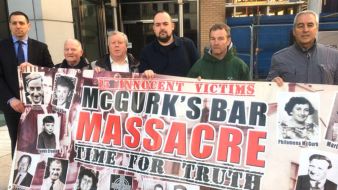There has been a “significant” increase in number of households overholding on properties, as housing charities warned that a lack of supply has limited people’s options.
It comes after the Department of Housing’s official tally for April indicated that there were 12,259 people in emergency homeless accommodation in April, including 3,594 children and 1,733 families.
The Oireachtas housing committee was also told on Tuesday that it was of “grave concern” that more families were contacting homeless services.
Threshold’s John-Mark McCafferty said that there were 475 households whose residents were overholding on their property in the first three months of the year, which represented a “significant” increase from 303 in the same period last year.
He said of the 475 figure, 125 were single people, 49 were couple households, 138 were one-parent families, and 148 were two-parent families.
“We don’t advise people to overhold… however it is understandable that many families, many individuals will have few or no options in relation to alternative accommodation in the market.
“We have certainly seen an increase in the phenomenon of overholding,” he said.
He said that despite the “very significant measures” by the government in recent months, the housing situation “generally has deteriorated” in recent years.
Mr McCafferty told the committee that one-parent families, those receiving social welfare payments or those on HAP are at “significantly greater risk” of homelessness than others.
“It’s becoming more difficult to prevent people from losing their homes or for people to find a new home and its primarily due to the large increase in the number of landlords who are choosing to sell their property.”
Mr McCafferty said that because Ireland relies so heavily on small landlords to house a large proportion of renters, he said that tax breaks are probably justified in this instance, but added that they do need to be focused.
Wayne Stanley, executive director of the Simon Communities of Ireland said that the increase in the number of homeless families according to the figures published on Friday was “a bit of a red flag”.
He said that this was one of the highest increases since 2018 and that there were “grave concerns” in the Simon Communities about the fact that “more and more families” were contacting them.
“I think the Tenant in Situ Scheme is an appropriate response to that and hopefully in the coming months we will see the impact of that,” he added.
He also said that there was “at some degree a brain drain” in the Simon Community as workers are drawn out of its services into the HSE and Tusla where they get “a very significant increase in pay”.
He called on the pay parity that existed before 2008 to be restored for frontline NGO workers.
Dermot Kavanagh, chief executive of Cork Simon, said that there are a growing number of “working homeless”, adding that these were “people who are in employment and it no longer provides a route out of homelessness”.
DRHE Director, Mary Hayes, and Deputy Director, John Durkan, appearing before the Joint Committee on Housing, Local Government and Heritage this afternoon. pic.twitter.com/6k0mFTCvXe
— Homeless Dublin (@HomelessDublin) May 30, 2023
Mary Hayes of the Dublin Region Homeless Executive (DRHE), the authority tasked with responding to homelessness in Dublin, said that efforts to prevent people from and exit people from homelessness were “hampered” by a lack of supply.
“It’s not presentations that are causing either the rising family or single homelessness in our mind.
“It is predominantly the fact that we are not exiting at the same rate and that is the real concern for me is the sense that because there isn’t available options for people to exit to, particularly in their in the private rented sphere, that is a concern for me because it leads to an increase or a banking up of homelessness.”
She said that a lot of migrant workers are drawn to the capital and can end up being homeless.
“What you have is a lot of people who may be migrants within Europe who went up to Dublin, are in private rented or staying with friends and family, and when that breaks down, they can be in emergency accommodation,” she said.
When asked whether the arrival of over 80,000 Ukrainian refugees fleeing the Russian invasion had put a strain on emergency accommodation, Mr Stanley said: “Some of the resources of local authorities have been utilised… to support the relevant department to find additional accommodation, so it might have put some additional pressure on finding emergency accommodation, but in terms of people experiencing homelessness there is, in my view, and from what I see you talking to the Simon Communities across the country, there is nobody who is in emergency accommodation because we took in people from Ukraine.

“And I put it as strongly and clearly as that.”
Ms Hayes said that the DRHE has no capacity to house more people, but would pass on accommodation that would not be suitable for the people they are trying to house to the International Protection Accommodation Services (Ipas) in some cases.
In terms of single accommodation there will be “pinch points”, she added, but believed that they would manage to house the families that are in need.







